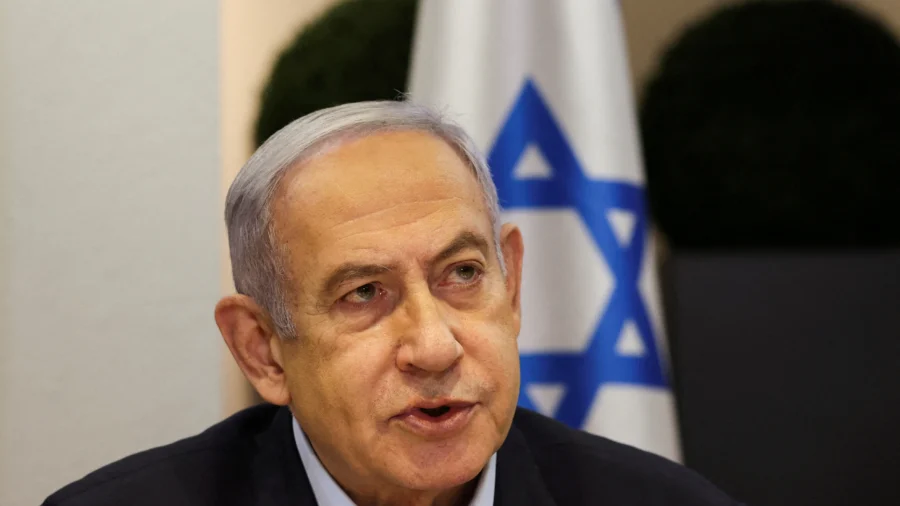Israeli Prime Minister Benjamin Netanyahu on April 30 reasserted his pledge to launch on offensive on the Southern Gaza city of Rafah, one of the last strongholds of the Hamas terrorist group in the Palestinian territory.
Mr. Netanyahu’s remarks came amid accelerating cease-fire negotiations between Israel and Hamas, and just hours before U.S. Secretary of State Antony Blinken arrived in Israel for another round of truce talks. Mr. Blinken’s visit is aimed at moving closer to a resolution of the conflict, by securing an agreement to release the hostages held by Hamas and to deliver relief to Gaza’s civilian population.
According to Mr. Netanyahu, the offensive on Rafah—which is currently sheltering hundreds of thousands of displaced Palestinians, as well as many Hamas terrorists—will happen regardless of whether a potential truce-for-hostages deal is struck.
“The idea that we will stop the war before achieving all of its goals is out of the question,” Mr. Netanyahu said, according to a statement from his office.
“We will enter Rafah and we will eliminate Hamas’ battalions there—with or without a deal—to achieve the total victory.”
The United States has voiced its opposition to the Rafah offensive in light of the vast number of people seeking shelter in the city. It has called on Israel to present a humanitarian plan that would protect the civilian population.
According to Mr. Blinken, Israel has offered a “strong proposal,” and he called on Hamas to respond in kind.
“No more delays. No more excuses. The time to act is now,” he said. “We want to see, in the coming days, this agreement coming together.”
Meanwhile, internal disarray could disrupt the Israeli government in the event of proceeding with a deal that might prevent Israel from invading Rafah.
On April 30, Mr. Netanyahu met with National Security Minister Itamar Ben-Gvir, according to the minister’s office, with Mr. Ben-Gvir saying that Mr. Netanyahu had pledged his ironclad commitment to the Rafah offensive, and to not entering into a “reckless deal.”
The United States has warned against any offensive that puts civilian lives at risk.
On April 30, Mr. Netanyahu addressed a small group of the families of the hostages, known as the Tikva Forum, who hold the stance that military action that eliminates Hamas should be prioritized over the freeing of hostages.
Critics of Mr. Netanyahu’s government have accused the prime minister of making decisions driven by political rather than national interests, a charge Mr. Netanyahu denies.
Moreover, the Israeli government could find itself on shaky ground in the event of any party opposing a deal and retracting its support for Mr. Netanyahu’s government.
Opinion polls have shown, however, that support for Mr. Netanyahu and his party has increased in recent months.
Israel’s Finance Minister Bezalel Smotrich said on April 29 that he was in favor of the “total annihilation” of Israel’s enemies—an apparent reference to Hamas—in a recording of remarks he made at an event marking the end of the Passover holiday and aired on Israeli media.
“You can’t do half a job,” he said.
The deal that is currently on the table and which was initiated by the United States, Egypt, and Qatar, would see the release of dozens of hostages in exchange for a six-week halt in fighting as part of an initial phase, an Egyptian official and Israeli media outlets reported.
It would also see the release of hundreds of Hamas-linked Palestinian prisoners held by Israel, including some serving long sentences.
Mr. Blinken, meanwhile, urged Hamas on April 29 to accept Israel’s proposal, which he referred to as “extraordinarily generous” on Israel’s part.
Hamas, however, has repeatedly demanded a complete end to Israel’s military action in Gaza and the withdrawal of all Israeli troops in return for the release of all hostages, while Israel has vowed to continue its offensive once the first phase of the deal is over.
The Israel–Hamas war was sparked by the unprecedented Oct. 7 massacre, in which Hamas terrorists killed around 1,200 Israeli civilians, and which subsequently led to Israel’s military efforts to eliminate the Hamas terrorist organization.
Since then, thousands more have been killed and hundreds of thousands of people have been displaced within Gaza, resulting in a humanitarian crisis. More than 100 civilian hostages are still held hostage by Hamas.
The Associated Press contributed to this article.


